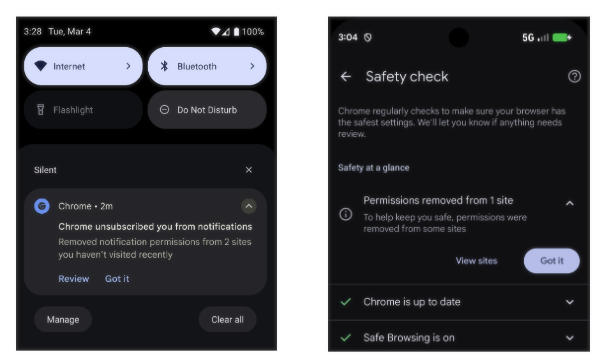Google is updating the Chrome web browser to automatically revoke notification permissions for websites that haven’t been visited recently, to reduce alert overload.
While Google Chrome’s Safety Check tool already removes access to other permissions, such as location and camera, this new feature will extend this functionality to notifications on both desktop and Android versions of the browser.
The company said the new feature is designed to target sites that send frequent notifications that get little to no user interaction. According to Chrome product manager Archit Agarwal, although users receive a high volume of alerts, fewer than 1% of these notifications actually generate any engagement.
Agarwal also noted that internal testing showed that this new feature led to a sharp decline in notification overload, with sites that sent fewer notifications actually seeing increased engagement.
Chrome will notify when a website’s notification access has been removed, and users can restore permissions through Safety Check or by revisiting the site and opting back in.
“But notifications can be genuinely valuable and helpful. Therefore, this feature will only revoke permissions for sites when there is very low user engagement and a high volume of notifications being sent,” Agarwal said.
“If you prefer to keep getting notifications from a particular website, you can easily re-grant the permission at any time through Safety Check or alternatively by visiting the site and enabling notifications again.”
Those who don’t want the web browser to automatically toggle off alerts from sites they haven’t visited recently can also disable the automatic revocation feature entirely.

This update is part of Google’s broader effort to improve browser privacy and safety features, as well as give Chrome users more control over distractions.
“We believe this change will lead to a cleaner, more focused browsing experience, and we’ll continue to invest in ways to help you manage your online interactions and reduce distractions, so you can make the most of your time online,” Agarwal added.
Since September 2024, Chrome on Android and Desktop has also enabled users to grant one-time website permissions, which are automatically revoked after leaving the site.
Early this year, Google also rolled out a Chromium change that “de-elevates” the Google Chrome web browser process so it no longer runs as an administrator, increasing Windows security.

Join the Breach and Attack Simulation Summit and experience the future of security validation. Hear from top experts and see how AI-powered BAS is transforming breach and attack simulation.
Don’t miss the event that will shape the future of your security strategy



